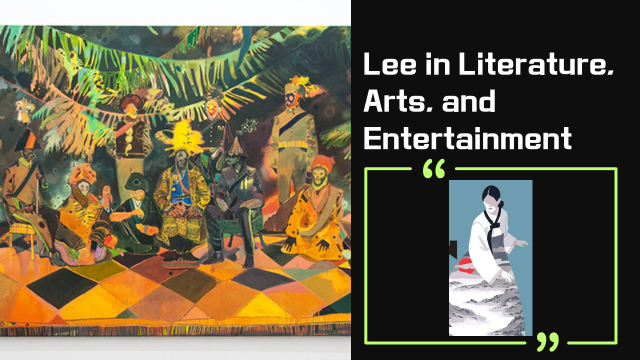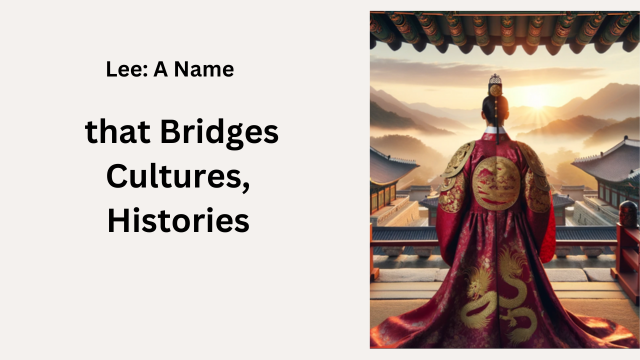Lee A Name that Bridges Cultures, Histories
and Identities The name “Lee” is universal in appeal, cutting across linguistic, cultural, and geographical boundaries.
Introduction:
The name “Lee” is a timeless and multifaceted term, full of history, culture, and meaning. From its ancient roots in Asia and Europe to its modern usage as a first name, surname, and cultural icon, “Lee” embodies a unique universality. Whether it’s tied to Chinese royalty, Korean dynasties, Anglo-Saxon pastoral life, or Irish storytelling traditions, “Lee” carries stories that span continents and generations.
Origins and Meanings
Chinese Heritage (李)
In Chinese culture, “Lee” or “Li” in Pinyin is the most common surname, traced back to ancient dynasties. The character 李 depicts a plum tree, considered in Chinese art and poetry as resilient and beautiful. Families bearing this surname trace their lineage to powerful clans and influential figures in Chinese history.
English Roots
From an Anglo-Saxon perspective, “Lee” is derived from Old English, meaning “a clearing in the woods.” Traditionally, it was a place name that eventually turned into a surname. It comes with a pastoral background which brings to mind images of lush meadows and serene landscapes.
Korean Connection (이/李)
In Korea, “Lee” (or “Yi” and “Rhee”) is a name that has often been used to signify royalty, scholars, and other historical figures. It shares the same Chinese character Li, thus reflecting the interlinked histories of East Asia.
Lee in Pop Culture
The name “Lee” has echoed beyond its historical roots and is often featured in literature, cinema, and music.Bruce Lee He is the father of modern martial arts. That’s why he remains as a long-lasting icon who epitomizes skill, philosophy, and cultural pride. His influence transcends boundaries, making “Lee” synonymous with discipline and strength.
A Name that Adapts
What makes “Lee” special is that it is flexible. It can be used as a first name or as a surname, and its adoption transcends cultures, gender, and age. It might symbolize family tradition or an artistic identity, but it remains dynamic, a fluidity of human connection.
Korean Legacy (이 or 李
The Lee (also Romanized as Yi, Rhee, or I) surname in Korea traces its origins back to ancient kingdoms where the group was associated with aristocracy and scholars. In South Korea, the Lee name became particularly prominent during the Joseon Dynasty from 1392 to 1897, when it ruled for over 500 years under the Yi royal house.
Irish Roots
In Irish tradition, “Lee” comes from the Gaelic Ó Laoidhigh, which means “descendant of Laoidhigh,” a name that is associated with a poet or bard. It symbolizes creativity and storytelling, thus linking “Lee” to a heritage of artistry.
Lee in Literature, Arts, and Entertainment
Lee” is now known worldwide because of the popular celebrities who have been identified to be named Lee.
Symbolism and Cultural Influence
The name “Lee” is often associated with cohesion, flexibility, and cultural acceptanc
e. Its widespread use across regions has also helped it blend into virtually any language without a hitch, evidencing its universality. Here’s how “Lee” has been represented across cultures: It means being a symbol of the Chinese “李”-“plum tree,” symbolic of resilience and rebirth, which is very precious in East Asian philosophy.
A Marker of Simplicity: In English, “Lee” suggests rustic simplicity and images of openness and natural harmony.
A Signifier of Nobility: “Lee” has long been synonymous with royal lineage, intellectual achievement, and cultural refinement in Korean history.
A Creative Identity: For many in the Western world, “Lee” is a versatile first name, used across genders and often chosen for its modern, minimalist appeal.
Conclusion
The name “Lee” is more than just a label; it is a vessel of meaning, history, and identity. From ancient Chinese dynasties to modern global pop culture, “Lee” bridges past and present, East and West, simplicity and sophistication. Its universal appeal and adaptability ensure that it will continue to be cherished for generations to come
FAQs
What does the name “Lee” mean?
In Chinese, “Lee” (李) means “plum tree,” or pluckiness and beauty. In English, it is from Old English lēah, a clearing in the woods. In Korean, “Lee” (이 or 李) is the same Chinese character as above and often carries connotations of nobility and heritage. From the name Ó Laoidhigh, Irish, comes; descendant of the poet or bard.
How is ”Lee” pronounced in different language?
In English, it is pronounced as “Lee” (/liː/). In Mandarin Chinese, 李 is pronounced as “Lǐ” (/li˨˩˦/). In Korean, it is pronounced as “Ee” (/i/), although it is commonly Romanized as “Lee” for international use.
How universal is the surname “Lee”?
The surname “Lee” is highly prevalent worldwide as it exists in various cultures: As one of the top 10 most common surnames in China. As the second most common surname in Korea, after “Kim”. It is also recognized widely in English-speaking countries though not as common as in Asia
What does “Lee” mean in Chinese culture?
In Chinese culture, the meaning of “Lee” (李) is the power to persevere and long-lasting beauty, symbolized by the plum tree or li that blooms even in extreme winter.
Do different versions of the name “Lee” exist?
Yes. Here are several variations and related names: Li: This is the Pinyin spelling of the Chinese 李. Yi/Rhee: Korean Romanized forms of 이 Leigh: An anglicized spelling sometimes used as an English first name. Leo: Sometimes linked as a form of modern adaptation
How has the popularity of “Lee” affected pop culture?
The power of “Lee” can be felt across the world’s pop culture: Bruce Lee reinvented martial arts and action cinema Stan Lee’s created superhero icons that rule popular media The name “Lee” features in numerous books, movies and music, representing might, creativity, or even just being a simplification

